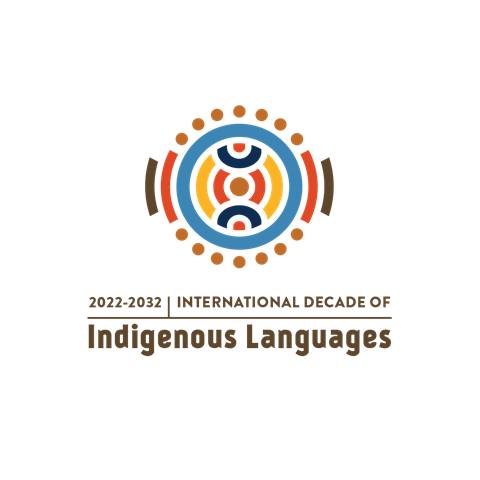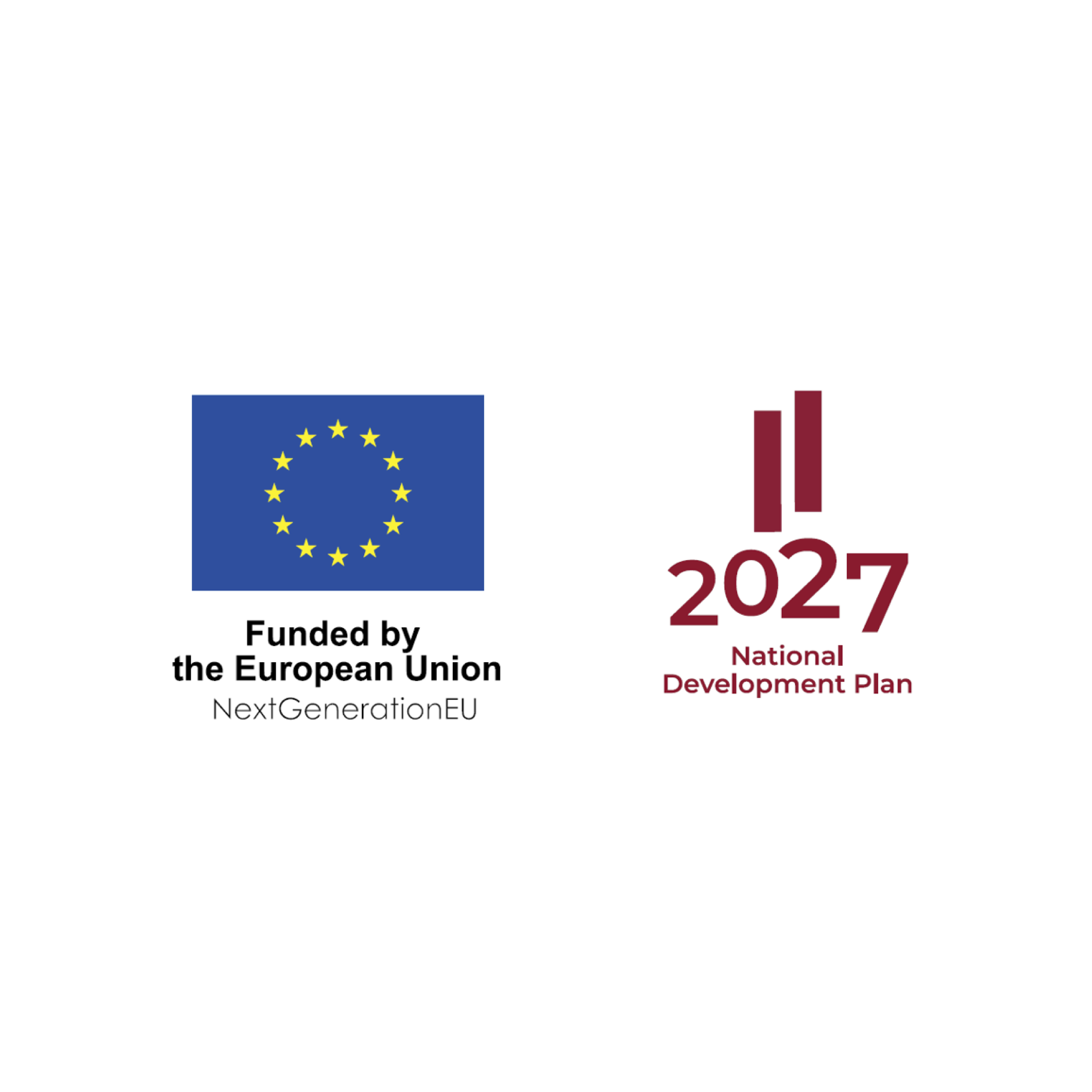December 22
The first Special Issue of the journal ESUKA/JEFUL on the South Estonian language island varieties has been published
Tartu University (TU) Institute of Estonian and General Linguistics in cooperation with the UL Livonian Institute has published the first special issue of the journal ESUKA/JEFUL on the South Estonian language island varieties — the Leivu, Lutsi, and Kraasna languages. The editors of this special issue are TU professor Karl Pajusalu and UL LI researcher Uldis Balodis. This is the first major work on the South Estonian language islands published in English. The Foreword for the special issue.
A few of the articles included in the Journal’s Special Issue:
- Balodis, Uldis; Pajusalu, Karl. Introductory survey of the South Estonian language islands. Eesti ja soome-ugri keeleteaduse ajakiri = Journal of Estonian and Finno-Ugric Linguistics 12(2). ESUKA– JEFUL 2021, 12–2: 7–31 pp. Scopus indexed. Open Access.
- Balodis, Uldis. Lutsi speakers and rememberers in the late 20th and early 21st centuries. Eesti ja soome-ugri keeleteaduse ajakiri = Journal of Estonian and Finno-Ugric Linguistics 12(2). ESUKA– JEFUL 2021, 12–2: 211–249 pp.
December 18
Ieva Vītola and Lolita Ozoliņa on and expedition to the Livonian settlements of North Vidzeme
December 7
Monthly Items – Ķempi Kārl newest poem “Tuļpuķķiž” (In Fireweeds)
During the Livonian Summer University in August 2021, the poet Ķempi Kārl, who writes in the Salaca Livonian language, has created one of his latest poems “In Fireweed”. Salaca Livonian language or the Vidzeme Livonian dialect is a variant of the Livonian language spoken in the ancient Livonian region Metsepole, and Ķempi Kārl is the only poet in the world who creates poetry in this lost and mysterious language. Equally mysterious is his poetry, as the Estonian writer and art critic Mart Velsker wrote, “in these poems language, places and love have the greatest importance and they do not care for the concept of time”. The article: http://www.livones.net/lili/en/notikumi/menesa-prieksmeti/monthly-item-122021
November 28
UL Livonian Institute consults the movement “Spēkozols” par Eiropas gada koka Latvijā nosaukumu
November 22
Monthly item – The first Livonian reading book
October 13–15
The rich participation of the UL Livonian Institute in the XIII International Baltic Congress
Among the invited keynote speakers this year was also the head of the UL Livonian Institute Valts Ernštreits. The video of the first day of the congress can be seen here, where Valts Ernstreits gave speech on “Livonian as a source for better understanding Baltic languages: opportunities and challenges” can be viewed starting at 2:15:49.

On the third day of the Congress, the second part of Section A was chaired by Gunta Kļava, a researcher at the UL Livonian Institute, who also presented her paper “The Role of the Livonian Language in the Consciousness of Liv Descendants”. Uldis Balodis, a researcher at the UL Livonian Institute, also gave a speach on “Exploring Lutsi isoglosses and subdialect divisions”.

The researcher at the UL Livonian Institute Milda Ona Dailidėnaitė presented her paper on “Functions and further developments of Livonian and Latvian indirect imperatives”.

The programme of the Congress can be viewed here and the book of abstracts can be viewed here. The tradition of the Baltic Congress began in 1965 in Vilnius. Until know the congress has taken place in Riga in 1980, 1995, 2000 and 2010 and this year in 2021, but remotely.
October 14
UL Livonian Institute participates in the international conference “The Individual, Society and Power at the Turning Points of the History of the Baltic Region”
UL Livonian Institute’s senior researcher Renāte Blumberga gave a speech on “Lībiešu Pirmā pasaules kara “izdzīšanas laiks”” starptautiskajā konferencē “Indivīds, sabiedrība un vara Baltijas reģiona vēstures lūzuma punktos”. This was the State Research Programme’s “Latvian Heritage and Future Challenges for the Country’s Sustainability” project’s “Interaction between the individual, the society and the state in process of the history of Latvia: conflicting values and formation of shared values during historical turning points” final conference, where the project researchers will present the results of the research in their lectures.
October 11
October Monthly Item published
The monthly item article by Baiba Šuvcāne has been published – Tombstones with inscriptions in Livonian in Kolka cemetery.
October 2
Postimees: Livonians rise from the ashes like a phoenix
An excerpt from the article by Hebo Rahkman:
- In Latvia, almost everyone now knows that Livonians exist today.
- So far, the Livonian language has been passed on as a living tradition.
- Many of Latvia’s more widely known people have Livonian roots.
- At present, the situation with Livonian in Latvia, especially in Riga, is better than in Estonia.
Rumors of the extinction of Livonians are exaggerated. This was reaffirmed in a discussion at the University of Tartu by Valts Ernštreits, Head of the University of Latvia Livonian Institute, Karl Pajusalu, Professor of Estonian Language History and Dialects at Tartu University, and Miina Norvik and Tuuli Tuisk, Professors and Researchers of Livonian at the Tartu University. The positivity that the whole conversation exuded could be inspiring to any small nation that is worried about its course.
September 26
Meeting “In the world of Livonian horror stories” during the European Day of Languages. Online event
At the event, the UL Livonian Institute introduces the Livonian language and its sound. Listeners are invited to listen to Livonian horror tales in both Livonian and Latvian, to learn about the heroes and events of legends, which are very unusual, interesting, maybe a little funny and, of course, scary, as in the world of horror! Facebook event. The recording will be added to the YouTube channel of UL Livonian institute at a later date.
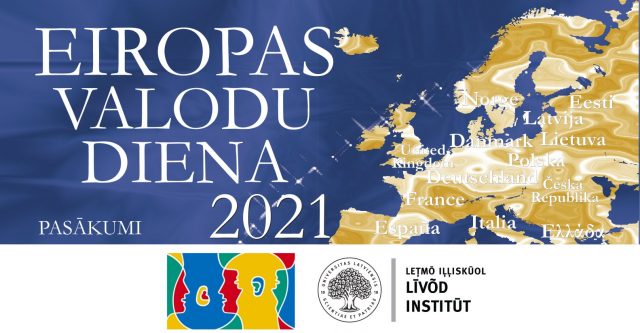
The UL Livonian Institute participated in the discussion on developments and challenges of Latgalian cultural space
On Sunday, September 26, a seminar was organised by the Latgalian Cultural Association with the Latvian National Cultural Center. Seminar’s on the issues of Latgale cultural space identity and its current challenges broadcast is available here. Language, culture and education issues were discussed and discussed in order to gradually prepare for next year’s Latgale Congress, which will take place in April. The Liv Institute of the University of Latvia also participates in negotiations on the topicalities and challenges of the identity of the Latgale cultural space.
September 24
LVportāls: The most important – a language must be used
For the first time, the goal of the Latvian state language policy planning this year is the Latgalian written language and the Liv language. LVportāls is looking for answers to what problems they face and what needs to be done to strengthen them not only declaratively, but also actually, highlighting the diversity of Latvian languages as a value. Valts Ernštreits, the Head of the UL Livonian Institute, also gives answers in the article “The most important thing is that a language must be used“.
September 23–24
UL Livonian isntitute participates in the conference “The Electronic Writing of the Peoples of the Russian Federation 2021 & IWCLUL2021”
The 21st Meeting of the Baltic Division of the United Nations Group of Experts on Geographical Names (UNGEGN)
UL Livonian Institute participates in the 21st Meeting of the Baltic Division of the United Nations Group of Experts on Geographical Names (UNGEGN). UL Livonian Institute talks about the new developments concerning the collection and usage of the Livonian place names (Valts Ernštreits, “Developments in collecting and using of indigenous (Livonian) place names in Latvia”). Agenda is available here.

Baiba Šuvcāne’s monthly item article about the Livonian king Kaupo, his monument in Krimuldā and the song dedicated to him.
September 1
UL Livonian Institute together with colleagues from Tartu University present a paper at SLE 2021
Norvik, Miina; Balodis, Uldis; Ernštreits, Valts; Kļava, Gunta; Metslang, Helle; Pajusalu, Karl; Saar, Eva. Typological convergence in the Central Baltic area. SLE 2021: 54th Annual Meeting of the Societas Linguistica Europaea. Programma pieejama šeit. Tēžu grāmata apskatāma šeit. 30.08.–03.09.2021.
August 13
Monthly Item of August
UL Livonian Institute monthly item: Livonian Summer University and the Lāži Oak.
July 30 – August 8
Livonian Summer University takes place
Livonian Summer University (LSU 2021) took place, organised by UL Livonian Institute and University of Tartu ASTRA project PER ASPERA. Supported by Ministry of Education and Science, Latvian Language Agency. Programme, teaching staff and other information is available here. Press release in Delfi.lv. Multiple seminars took place during the LSU:
July 21
UL Students’ Council visits the UL Livonian Institute
Representatives of the University of Latvia Students’ Council visited the UL Livonian Institute to film a video series “In the Footsteps of an Institute”. To learn what we discussed at the UL Livonian Institute you’ll have to wait until autumn, when all the videos will be published. University of Latvia Students’ Council is preparing for the University of Latvia Students’ Conference “Initium”.
July 13
Monthly Item of July
Baiba Šuvcāne monthly item article – Cape of Kolka Lighthouse’s residential building.
July 8
State Research Programme “Latvian Studies for the Development of Latvian and European Society”
The new Ministry’s of Education and Science State Research Programme “Latvian Studies for the Development of Latvian and European Society” also includes tasks related to the development and acquisition of the Livonian language.
July 7
Valts Ernštreits talks about the Historical Land Law with Māris Zanders
In a conversation with Māris Zanders, the Head of the UL Livonian Institute Valts Ernštreits talks about the Historical Land Law in the disucssion series “Kur tas suns apraksts?” (What’s the catch?).
June 30
UL Livonian institute helps the magazine “Ilustrētā Junioriem” to gives answers about Livonians
In the magazine “Ilustrētā Junioriem” (Illustrated for Juniors) Daniels Skulte asks “Is the Livonian language still alive?” The magazine, with the help of the UL Livonian Institute, provides answers about the Livonian language today and in the past, as well as about the connection between the Livonian and Latvian languages.
June 23
UL Livonian Institute wishes everyone a Happy Midsummer!
In the spirit of Midsummer festivities UL LI also offers the opportunity to fill out a crossword puzzle.
June 16
VIII World Congress of Finno-Ugric Peoples has started in Tartu
In the introduction to the congress, the President of Latvia Egils Levits addressed the Finno-Ugric peoples (video), highlighted the Finno-Ugric identity of Latvia and also mentioned the contribution of the UL Livonian Institute to the care and maintenance of the Livonian cultural space.
March 24
UL Livonian institute participates in a public demonstration seminar online
On March 24, at the demonstration seminar on the possibilities of using digital resources of Humanities, the UL Livonian Institute will talk about their designed resources for the Livonian language and culture. https://fb.me/e/3oUv6VZoq
March 22
UNGEGN reiceives a Report of Latvia, which includes a chapter on the work UL Livonian Institute is doing for collecting Livonian place names
United Nations’ Group of Experts on Geographical Names (UNGEGN) in the preparation of the 2nd Session of the United Nations Group of Experts on Geographical Names has received a Report of Latvia (Documents/Agenda item 4(a) / Report of Latvia), that includes a chapter on work UL Livonian Institute is doing for collecting place names in the indigenous language of Latvia – Livonian.

First meeting of the Global Task Force for UNGEGN
In March 22, the Head of the UL Livonian Institute Valts Ernštreits participates in the first Meeting of the Global Task Force for making a UN Decade of Indigenous Languages (2022–2032). The goal we stand for is to bring all indigenous languages of the world back to the spotlight that they belong in.
March 18
UL Livonian institute researcher Milda Dailidėnaitė presents on the topic of challenges of teaching the Livonian language
Milda Dailidėnaitė participates in the 56th International Academic Conference Online in honour of Professor Arturs Ozols “Grammar and language acquisition” with a presentation “Challenges in teaching the Livonian language based on examples of jussive”.18.03.2021.
March 15
The first official working day of the Head of the UL Livonian Institute, representing the Republic of Latvia at the UN Global Task Force for Making a Decade of Action for Indigenous Languages
March 15 is the first official working day of the Head of the UL Livonian Institute, Valts Ernštreits, representing the Republic of Latvia as a member of the Global Task Force of the International Decade for Indigenous Languages (IDIL; 2022–2032) proclaimed by the UN on 18 December 2019.
Over the next 3 years, V. Ernštreits will use his own experience, which being Livonian himself, he has gained by caring and fighting for the future of Latvia’s indigenous people – Livonians, in order to make all the indigenous languages of the world stronger, more sustainable and more visible. On March 15,the task force begins consultative meetings with the representatives of indigenous people, language researchers and activists, as well as state institutions of Eastern Europe and Central Asia, to identify the priorities to be included in the Global Action Plan of the IDIL. Read more here.

March 14
UL Livonian Institute participates in organising the Estonian Mother Language Day event
March 10
The UL Livonian Institute participates in the 27th International Scientific Conference of the University of Liepaja “Current issues in research of literature and culture”
Valts Ernštreits, Milda Dailidėnaitė, Annija Rošane, Elvīra Kalniņa participates in the presentation “Integration of data from different fields as an opportunity for interdisciplinary research: Livonian model” at University of Liepaja 27th International Scientific Conference “Current issues in research of literature and culture” in the digital humanities panel “Digital Resources of the Humanities: Experience and Cooperation”. The full conference program is available here.
UL Livonian institute demonstrating Livonian language resources created by the UL Livonian Institute
Valts Ernštreits talks about the Livonian language resources created by the UL Livonian Institute in a demonstration seminar and a discussion about the use of digital resources in the humanities, which takes place during the 27th International Scientific Conference of Liepaja University. Agenda.
March 4
UL Livonian Institute participates in the discussion on indigenous issues – 2nd day.
March 3
UL Livonian Institute participates in the discussion on indigenous issues.
UL Livonian Institute participates in the discussion on the United Nations Permanent Forum on Indigenous Issues.
February 24
UL Livonian Institute researcher Uldis Balodis’s book “Lutsi kiele lementar = Ludzas igauņu valodas ābece” is recognized as the best social sciences book of 2020 at the University of Latvia.
UL Livonian Institute researcher Uldis Balodis received a letter of congratulation from the University of Latvia about his book, the development of which lasted for several years, including the PostDoc period and afterwards. This February it was recognized as the best book of 2020 in the social sciences at the University of Latvia!
February 22
Taking part in the conference “Baltic onyms: from past to present”
Valts Ernštreits and Annija Rošāne took part in the conference Baltic onyms: from past to present to commemorate the 148th anniversary of the academician Jānis Endzelīns with the presentation Pētõr Damberg Livonian place name collection. Conference’s programme.
February 21
Project’s “Sing along and learn Livonian!” closing concert
On Mother Language Day, February 21, 2021, at 4 o’clock on the Zoom platform a closing concert of the project “Sing along and learn Livonian”. Listeners and viewers had the opportunity to hear songs performed by the authors and listen to conversations about the process of the project, the situation of the Livonian language and its role today. UNESCO press release here and here. The Facebook event.
You can find out more about this and other UNESCO International Days in the Annual Planner.
Discussion on the directions and actions of the KPR Development Programme 2021–2027 (online)
Valts Ernštreits, Head of the UL Livonian Institute, on the preservation and use of the language and intangible heritage of Kurzeme, the accessibility of culture in the regions and the use of digital resources in the discussion group on the development of the Kurzeme Planning Region Development Programme 2021–2027.
February 12
The seventh song has been published in the project “Sing along and learn Livonian!”
“Sing along and learn Livonian!” project’s seventh song has been published – Mis kītõbõd lūomõd. Performed by Julgī Stalte (author of the song) and her children – Lelū Stalte, Anna Kī Stalte. The project was made possible with the support of State Culture Capital Foundation (SCCF), read more here. The full playlist of the original songs can be found here. For musicians and choirs or for personal use the full score of the songs is available here.
February 9
An article by UL Livonian Institute researcher Valts Ernštreits has been published on cardinal and intercardinal directions in Livonian.

February 5
The sixth song has been published in the project “Sing along and learn Livonian!”
“Sing along and learn Livonian!” project’s sixth song has been published – Ūomõg um. Performed by Ulla Frasere (author of the song) and Ģirts Gailītis. The project was made possible with the support of State Culture Capital Foundation (SCCF), read more here. The full playlist of the original songs can be found here. For musicians and choirs or for personal use the full score of the songs is available here.
February 3
Monthly item – Declarations of Īra (Lielirbe) village residents to Lielirbe school’s administrator.
Article has been written by Baiba Šuvcāne. Read the article to find out why they were made int the first place.

January 30
In response to a request from the UL Livonian Institute, a Braille script has also been created for Lutsi!
Many thanks again to Harris Mowbray!
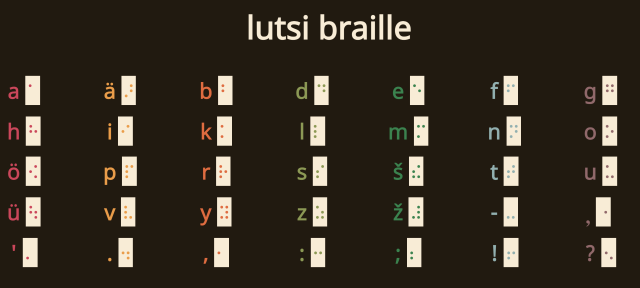
January 29
UL Livonian Institute researcher Uldis Balodis has been nominated for the Latgale culture award “Boņuks 2020” for his Lutsi language primer.
Article in the portal lakuga.lv in Latgalian.
The fifth song has been published in the project “Sing along and learn Livonian!”
“Sing along and learn Livonian!” project’s fifth song has been published – Lugūd. Performed by Julgī Stalte (author of the song) and her children – Lelū Stalte, Anna Kī Stalte, Kārlis Oskars Stalte. The project was made possible with the support of State Culture Capital Foundation (SCCF), read more here. The full playlist of the original songs can be found here. For musicians and choirs or for personal use the full score of the songs is available here.
“Sing along and learn Livonian!” project’s fifth song has been published – Lugūd. Performed by Julgī Stalte (author of the song) and her children – Lelū Stalte, Anna Kī Stalte, Kārlis Oskars Stalte. The project was made possible with the support of State Culture Capital Foundation (SCCF), read more here. The full playlist of the original songs can be found here. For musicians and choirs or for personal use the full score of the songs is available here.
January 28
On the LR3 programme “Rīta regtaims” fourth story – “Do you know why the Livonian festival is celebrated on the first Saturday of August?”
The Head of the UL Livonian Institute Valts Ernštreits talks about the construction of the Mazirbe The Livonian Community House, the fate of this house in the course of history and the emergence of the Livonian festival.
January 25
For the first time a braille alphabet has been created for the Livonian language!
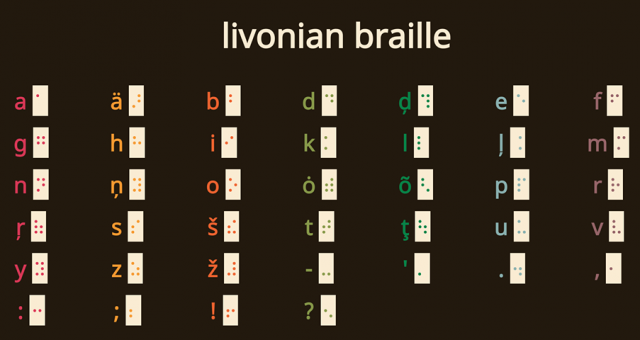
January 22
The fourth song has been published in the project “Sing along and learn Livonian!”
“Sing along and learn Livonian!” project’s fourth song has been published – Ku ma randõ lǟb. Performed by Ulla Frasere (author of the song) and Ģirts Gailītis. The project was made possible with the support of State Culture Capital Foundation (SCCF), read more here. The full playlist of the original songs can be found here. For musicians and choirs or for personal use the full score of the songs is available here.
January 21
The opening of registration for the 3rd Livonian Summer University (LSU 2021).
LSU2021 will take place in Kuoštrõg (Košrags), Latvia from 30 July to 8 August and is a great opportunity for MA/PhD students and researchers to start or continue learning Livonian, participate in research workshops, get to know more about Livonians, their history and culture as well as lay foundations for future cooperation in research projects. You can find more information and the registration form here.
January 20
On the LR3 programme “Rīta regtaims” third story – “Do you know that every one of us knows a little Livonian?”
The Livonian language has flowed into Latvian and has largely determined what it is like today – both the emphasis in Latvian on the first syllable and the fact that many of our everyday words have their roots in Livonian. The Livonians themselves have also left significant traces in Latvian culture – both Kārlis Baumanis and Jānis Erenštreits, Inga Ābele and Krišjānis Kariņš have Livonian roots. The speaker of this episode is Valts Ernštreits, the Head of the UL Livonian Institute.
January 18
University of Latvia Livonian Institute receives grant from Horizon 2020 subprogramme for research of Livonian heritage
The University of Latvia Livonian Institute (Latvia) along with project partners from University of Groningen (Netherlands), University of Tartu Institute of Estonian and General Linguistics (Estonia) and leader of the project – Falmouth University (United Kingdom) have received funding through the joint transnational call ‘Cultural Heritage, Identities & Perspectives: Responding to Changing Societies’, organised by the European Joint Programming Initiative Cultural Heritage. In the JPICH CHIP Call for Proposals 90 interdisciplinary research proposals were submitted by transnational consortia within the context of a single project. Only six projects were elected for funding.

January 15
The third song has been published in the project “Sing along and learn Livonian!”
“Sing along and learn Livonian!” project’s third song has been published – Tējizt. Performed by Julgī Stalte (author of the song) and her children – Lelū Stalte, Anna Kī Stalte. The project was made possible with the support of State Culture Capital Foundation (SCCF), read more here. The full playlist of the original songs can be found here. For musicians and choirs or for personal use the full score of the songs is available here.
January 13
On the LR3 programme “Rīta regtaims” second story – “Do you know why Finns, Estonians and Livonians stand up at the sound of the same melody?”
Valts Ernštreits, the Head of the UL Livonian Institute, tells about how the song composed by the Finnish composer Fredrik Pacius became the Finnish, then the Estonian and Livonian national anthem and also what is symbolized by the three colours – blue, white and green – in the Livonian flag.
January 8
Monthly item – photograph of Viktors Bertholds – a Livonian, a fisherman, a healer
Photograph comes from B. Šuvcāne’s archive. On January 16, 2021, we commemorate Viktors Bertholds’ 100th anniversary. Read more here.

January 6
On the LR3 programme “Rīta regtaims” – “Do you know that the most endangered language in the European Union can be found in Latvia?”
From January 4, the Latvian Radio 3 programme “Rīta regtaims” will feature a new informative rubric “Do you know?” The first story provides an answer to the question “Do you know that the most endangered language in the European Union can be found in Latvia?” Valts Ernštreits, a Liv linguist and the head of the Liv Institute of the University of Latvia, who is also a translator and poet and one of the creators of the portal livones.lv, talks about the history and present of the Liv language.
In 900 seconds – The UL Livonian Institute invites you to sing along and learn Livonian!
Valts Ernštreits and Annija Rošane talk about the project “Sing along and learn Livonian!”, the Livonian journey to UNESCO and the Decade of Indigenous Languages.
The second song has been published in the project “Sing along and learn Livonian!”
“Sing along and learn Livonian!” project’s second song has been published – Vērmõd. Performed by Ulla Frasere (author of the song) and Ģirts Gailītis. The project was made possible with the support of State Culture Capital Foundation (SCCF), read more here. The full playlist of the original songs can be found here. For musicians and choirs or for personal use the full score of the songs is available here.


